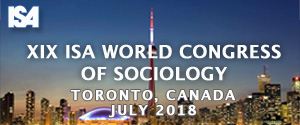Contested cities: voices of the margins – University of Pune
19th Dec 2011 | By Shruti Tambe | Category: 2012 Pune, India, Conferences, News & Events, Other International ConferencesDepartment of Sociology, University of Pune, Pune, Inida
Centre for Advanced Studies
National seminar on
Contested cities: voices of the margins
17-18th January 2012
Contemporary urban in India is ever changing. Rapid rate of urbanization, expansion of small and big cities, growing service industry attracting scores of migrants to cities, the government’s focus on the urban centres as ‘engines of growth’ overlap and influence shaping of the contemporary urban scenario.
One set of debates relating to the urban is about spaces of flows and spaces of places defining the social processes of individuation and sociality. Qualifying and examining urban existence in terms of these seeming bipolarities is a challenging task. Does location in the global north and the global south essentially determine the position in this debate or is the picture much more complex with local political, cultural economic realities shaping the urban? What does contemporary phase of urbanization has in common with earlier phases or is today’s situation uniquely defined by a number of processes? How does it relate to socio-political and cultural changes other than what the rhetorical term globalization denotes?
A second set of debates is about the issues which trigger collective action. Ranging from contemporary meanings of ‘urban’ ness to access and availability of infrastructure, services and entitlements; and citizenship rights- there are formulations about various kinds of collective action. Along with erstwhile class based collective identities there are various forms of identity politics that leads to collective actions. Sometimes collective action is triggered by new policies or demands for new laws. Sometimes it is in the form of a response to existing regimes of values, norms and regulations.
A third set of debates is related to the form of political action. From union politics to platforms and fora emerging for certain causes; from campaigns to agitations; from institutionalized to non-institutional action the range is analytically very rich and varied. We observe creative redefinition of urban politics with new technologies initiating new sites of political action. For example, emergence of social networking sites as new political locations is worth scrutinising.
Another set of debates is about policy reforms. Though in case of India declaration of policies relating to various facets of the urban is welcome given the near total absence of it; what do infrastructural, housing and regulatory policies indicate? What can one say about the position of the state viz. a viz. the urban especially the urban poor? Is it that global agendas for the urban are being replicated in Indian policy documents? What are various responses of the urban poor to government decisions, and policies?
Alongside there are discussions about various forms of identity leading to articulation of politics and counter-politics in the urban arena bitcoincasinos. Interestingly, new urban imaginaries and new cultural politics of identity is a phenomenon few have engaged with.
This national seminar would include papers on some or all these aspects including-
-
Conceptual and Theoretical Issues
-
Space, services and infrastructure
-
Work, livelihoods and labour
-
Movements and Collective action
-
Hegemonic and counter-hegemonic urban cultural imaginaries
Submission of Abstracts and Papers
Well researched papers are invited to be presented in the seminar from academicians, activists, policy makers, politicians, planners, researchers and representatives of Government and non Governmental organizations.
The delegates are requested to send the abstract of their papers on the main theme and sub themes of the seminar along with the duly filled registration form. Each abstract, not exceeding 300 words should reach the coordinator as soon as possible and latest by January 1st, 2012. The full length paper should be about 3000 to 5000 words. A hard copy and a soft copy of the paper in CD should also be submitted at the time of the seminar. We intend to publish the selected papers presented in the seminar in a special volume.
Travel and Accommodation
Boarding and lodging arrangements will be made for all the participants in the university campus. It may be difficult for us to meet travel expenses of all the participants. You are requested to get your TA/DA from your institution. But we will provide travel expenses to some resource persons and selected paper presenters, preferably by 3-tier A/C.
Organizing Committee
Dr. Shruti Tambe, Coordinator of the Seminar
Prof. Swati Shirwadkar, Head of the Department of Sociology
Sanjay Kolekar
Dr. Anurekha Chari

